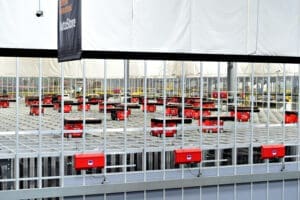[ad_1]


AutoStore has a lot of buzz surrounding it. This public company (OSE:AUTO) headquartered in Norway achieved revenues of nearly $650 million in less than 20 years. The company continued to grow during COVID even as the industry shrank. And their revenues don’t include services – they work through system integration partners.
Medline was the first company in the United States to adopt the AutoStore robotic order fulfillment solution and Medline is the largest AutoStore user in the world. Medline has over 1,700 robots across 20 installations. The newest implementation, which will be christened at the end of March, is in Medline’s facility in Wilmer, Texas.
Medline is a medical supply manufacturer, distributor, and solutions provider. Medline, with revenues of over $21 billion annually, is headquartered in Northfield Illinois. Medline has had 56 consecutive years over year-over-year growth. Medline is the largest supplier of clinical supply chain services to US medical surgical establishments. Their customers include large scale hospital systems, physicians’ offices, surgical centers, and long-term care facilities.
The breadth of customers Medline serves ranges from very big facilities to home health patients. The company has made significant investments in their supply chain. Even before the pandemic hit, Steve Miller, the executive vice president of supply chain at Medline, explained that the healthcare giant “had a very focused capital investment campaign in something we call ‘the healthcare resilience initiative.’ And through that, we’ve invested more than $2 billion back into our manufacturing footprint, our distribution footprint, and technology and systems to make sure that we’re continuing to be very resilient.”
Medline’s first AutoStore went live in 2013. Daniel Schwartz, the vice president of engineering at Medline, describes this solution as having a dense grid structure that contains bins stacked on top of bins with product in them – “like a big 4D Rubik’s Cube. Then you have the robots on top of the grid, and they are in charge of ensuring that the right bin is moved to the right place.” The robots are doing a combination of digging, getting to bins that are at the lower levels and moving them out of the way, and selecting the bin that is needed. This is being orchestrated by the software that controls this automatic storage and retrieval system. “That software is really the secret sauce of AutoStore.”
Why AutoStore?
Back in late 2011, “we knew we were reaching an inflection point,” Mr. Schwartz explained. The number of lines of less than case picking they were doing per day was rapidly increasing and they were worried that the ability to hit their next day service commitments, in an operation that was already tight, would be affected. Medline needed automation to keep up with the growth.
Medline did an exhaustive search and selected AutoStore. SwissLog was selected as the implementation partner and the source of the warehouse control software that links AutoStore to Medline’s warehouse management system. It is the combination of both the Swisslog software and the “robustness of the AutoStore design” that has made Medline so happy with this solution.
AutoStore is a heavy automation solution that is a multi-million dollar investment. The exact amount depends on “the other ancillary pieces we’re putting with it, whether that’s additional conveyance, mezzanines, and the number of pick stations.
What Were the Results?
Throughput did increase. While the speed varies based on what types of orders are being fulfilled, typically they see picking throughput increase 2-4 times. And this is on top of already strong picking capabilities.
The system has proven to be reliable. There is little downtime. Medline attributes this to a limited number of failure points in the system.
This solution, while not as flexible as autonomous mobile robots, is more flexible than other forms of bolted down heavy automation. “In fact, across our 20 installations, we’ve done four or five expansions to those systems, Mr. Schwartz said. Because the solution is composed of modular pieces, “you can add pick stations, you can add robots, you can expand the grid.”
Flexibility is not just based on the ability to modularly expand the solution. It is the flexibility to serve the full continuum of care – customers that range in size and depth of orders. This customer mix includes orders that contain only one or two items for home delivery – a fast-growing market. To support these small orders Medline customized their pick station design, supporting conveyance, and they made some software changes in how orders were dropped into the system.
AutoStore has also increased picking accuracy, safety, improves the ability to bring new workers up to speed, and even helps with worker retention. “One of the great things about the AutoStore technology,” Mr. Miller said, is this part of a distribution center is “a preferred place for team members to work in.”
“The workforce definitely is not as available and as plentiful as it used to be. AutoStore’s technology allows companies to do more with less people, and it’s very, very easy to train somebody how to operate our system,” said Paul Roy, Vice President & Managing Director, North America at AutoStore. “We’ve had some customers tell us that it takes them two weeks to train somebody how to pick down an aisle, and yet with our system, they can train them in a couple of hours.”
[ad_2]
Source link












